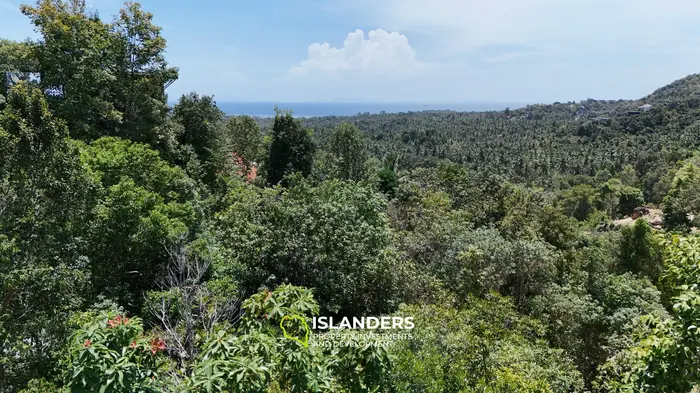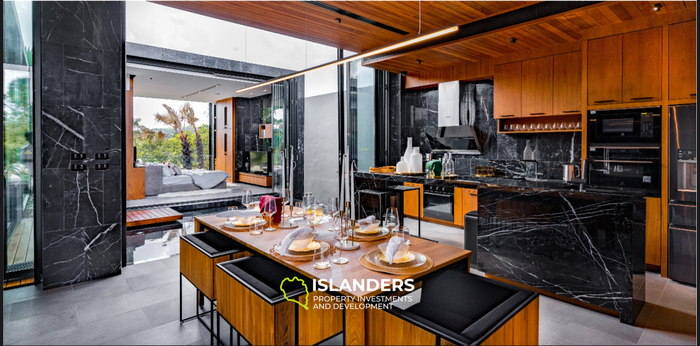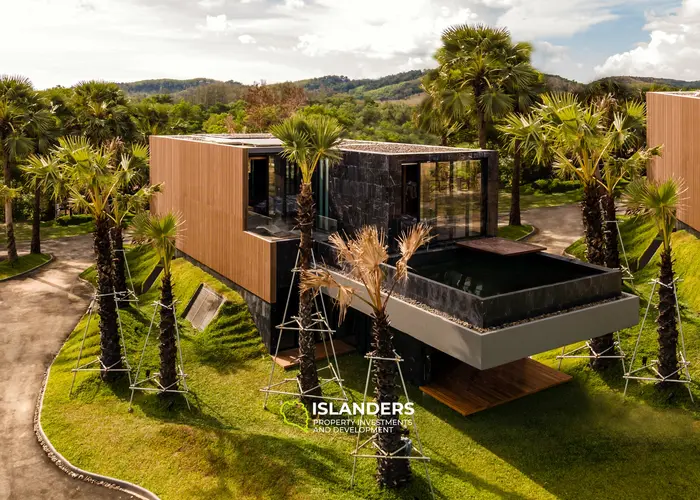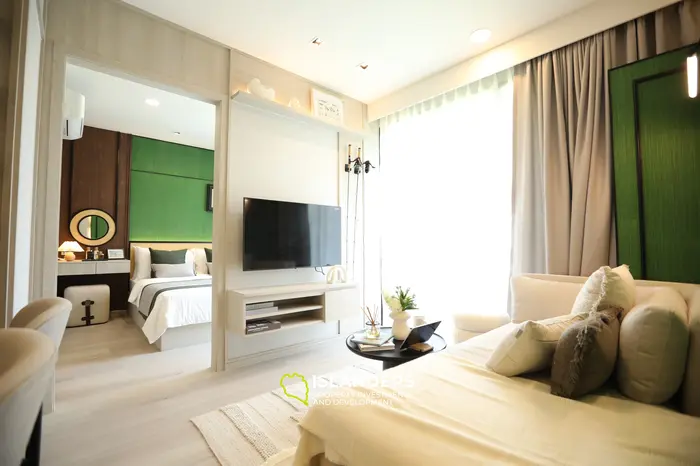Contents:
- Features of buying Thai housing
- What kind of housing can you buy in Thailand?
- Forms of ownership in Thailand
- Real estate and residence permit in Thailand
- What responsibilities does the owner have?
- Search for real estate in Thailand
- Step-by-step transaction procedure
- Property prices in Thailand
- Loans and installments for foreigners
- Our real estate offers
- Summary
Thailand is a place not only for a comfortable holiday, but also for profitable investment.
Acquiring housing in the kingdom for residents of the Russian Federation is not a difficult task, but it still has some legal aspects that are important to study.
Features of buying Thai housing
Thailand attracts both tourists and entrepreneurs. Real estate in the kingdom is purchased for permanent or temporary stay, or for renting out the property. After the pandemic, the cost of Thai housing fell significantly, which is why there were even more investors.
Foreign citizens can purchase housing in Thailand. Non-residents have the right to purchase real estate only subject to restrictions on registration of property rights. Foreigners can register a house in their name, but not a plot of land. Therefore, a property is purchased, and the land on which it is built and nearby is rented (usually a long-term lease is issued).
What kind of housing can you buy in Thailand?
Thailand has so-called freehold zones. Non-residents have the right to buy condominium housing. That is, in a residential complex. It must be in joint shared ownership of the apartment owners.
According to the law, the residential complex developer can sell 49% of the apartments to non-residents of the country. 51% is registered as a long-term lease (Leasehold).
Residents of the Russian Federation and other countries of the former Soviet Union can buy real estate in both Leasehold and Freehold (full ownership rights)[1]. But this only applies to the property itself. Foreigners have the right only to rent land for a long time.
Important! Only foreign legal entities can purchase a house and land in full. And only if the controlling stake belongs to a Thai (more than 51%).
Ownership forms in Thailand
It is important to study what forms of real estate ownership exist in this country[2]. There are two main options.
Freehold is the acquisition of one hundred percent rights to real estate. In the kingdom, any real estate can be purchased in Freehold only if it is located in a free use zone. Such housing is suitable for personal residence (year-round and seasonal), for renting, you can draw up deeds of gift, include it in an inheritance, and so on. That is, a foreigner can manage the property in any way he likes. When registering houses in Freehold, a chanot document is drawn up.
Leasehold is a long-term lease of housing or land, which foreigners have the right to renew no more than 2 times. The lease term is 30 years, then it can be renewed 2 more times for 30 years. Real estate and land in Leasehold can also be transferred to other persons. The contract is drawn up by a lawyer and certified by a government agency.
Real estate and residence permit in Thailand
You should not count on receiving a residence permit for purchasing a home. You can only apply for a long-term visa. There is a special Thailand Elite program for this. It can only be used if the value of the property is more than 17.5 thousand dollars. Developers in Thailand, in order to sell housing profitably and quickly, often offer foreigners to immediately apply for a visa when registering an apartment.
What responsibilities do the owner have
The first and main responsibility is to pay taxes, as well as utilities. Spending doesn't stop immediately after purchase. You need to pay a one-time fee. It is not fixed, it is 2-3% of the purchase amount.
Tax residents of the Russian Federation are required to pay taxes in both countries.
Help! A person is considered a tax resident in Russiaa trapper who lives on its territory for more than 183 days during the year.
If a Russian tax resident has acquired a property in the Thai state, he must notify the tax authorities about this.
Search for real estate in Thailand
You can find houses and apartments in Thailand on your own or contact the Academy of Sciences. The first option seems more profitable. However, in reality this is a dubious saving. It is not recommended to make transactions on your own in Thailand, since paperwork can have a lot of pitfalls. Therefore, it is better to carry out everything through a realtor and lawyer. A properly concluded contract is the key to a successful purchase. When contacting an agent, you must determine for yourself:
- 1. Purchase budget;
- 2. Approximate area of the property, number of rooms;
- 3. Which area is suitable;
- 4. Type of property: villa, apartment, townhouse and so on;
- 5. Purpose of purchasing a home.
Step-by-step transaction procedure
Registration of rights to real estate takes place in several stages. You should definitely study them before purchasing real estate.
- 1. Selecting and reserving an object
- 2. Checking the condition of the property and the purity of the transaction
- 1. Studying the history of the site (who are the owners, are there any heirs, and so on);
- 2. Seller verification;
- 3. Studying transaction documents;
- 4. Government registration of purchase.
The first thing you need to do is reserve the volume of real estate. Between the buyer and the seller (developer). It specifies the parties, the main characteristics of the property, the rights and obligations of the parties. At the reservation stage, a non-resident must pay 1% of the purchase amount. Only then will the property be removed from sale. To make a reservation, you will need the following documents: a copy of a foreign passport, phone number, address, email.
It is difficult to check the condition of real estate on your own. Therefore, it is best to contact a lawyer. It will be able to perform the following operations:
Important! When buying housing on the primary market, you should only check the contract. A full legal check is ordered when purchasing a secondary product.
Concluding an agreement
The next stage is concluding an agreement. 14-21 days after making the deposit, an agreement must be drawn up with the home owner or developer. If the transaction is concluded with the developer, then he provides a preliminary agreement for review and, if necessary, changes are made. If the owner of the property is not a legal entity, but an individual, then the documents are usually drawn up by a legal company. The contract must include:
- 1. Basic information about the object of purchase;
- 2. Purchase form;
- 3. Cost information;
- 4. Penalties for failure to fulfill obligations under the contract.
Copies of identification documents of the two parties, as well as documents of the property are attached to the agreement.
Payment for the transaction
If a non-resident purchases an apartment in a new building, then any non-cash transfer can be made, no matter what country it is made from. If we are talking about buying a secondary car, then usually an account is opened in a local bank, to which funds from another country are transferred. The receipt must be presented to the seller when completing documents at the Land Department of Thailand.
Important! If real estate or land is purchased in freehold, then the money must come from another country.
Registration of property rights
Regardless of the type of real estate, registration of ownership is carried out in the Land Department of Thailand. There you receive a package of papers. It depends on the specifics of the transaction. For example, if real estate is purchased in freehold, then the new owner receives:
- 1. Sales and purchase agreement;
- 2. Certificate for land (chanot);
- 3. House book
Real estate prices in Thailand
The average cost of housing in Thailand, according to the latest data, is $3,600 per 1 square meter. Prices vary depending on the location of the property. For example, in tourist areas it will be more than 3 thousand dollars, and in the “regular area” (in the depths of Phuket) the price is half that.
Usually non-residents buy apartments in a condominium. There is a lot of such housing in the country and it is profitable. Especially if you invest money at the stage of creating the foundation.
Loans and installments for foreigners
Non-residents in Thailand cannot obtain a loan from a local bank. But if you don’t have enough money, you can take out an installment plan for new apartments or houses from developers. If the purchase is made during the construction stage, the developers offer interest-free installments. The payment schedule must be specified in the transaction agreement.
Our real estate offers
Find ideal housing in Thailand for permanent, seasonal or you can invest on our website. You will find different real estate options: apartments, villas, townhouses, offices and so on. You can also view land options here. A wide variety of real estate and low prices will pleasantly surprise you. You can always contact our specialists for advice.
Summary
- 1. Non-residents of the country can purchase any type of real estate. Only the form of ownership may differ: freehold or leasehold;
- 2. Regardless of the form of ownership, the owner can dispose of the housing in any way he wishes: sell it, donate it, pass it on by inheritance;
- 3. A non-resident who owns real estate in Thailand is required to pay taxes and utilities;
- 4. It is possible to complete transactions both in person and remotely.
So, buying a home in Thailand is a quick and fairly simple process. But deals have pitfalls that need to be studied before completing the documents.
References
[1]. Kudryashova P. S. POSSIBILITY OF BUYING HOUSING IN THAILAND FOR FOREIGNERS / /Forum of young scientists. – 2017. – No. 6 (10). – pp. 1032-1036.
[2]. Zolotukhin I. N. Some aspects of the life of Russians in Thailand (using the example of Pattaya) // News of the Eastern Institute. – 2012. – No. 1. – pp. 79-89.






